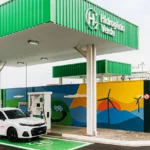Logistics infrastructure is a central pillar for any nation’s success in international trade. Ports, airports and highways, for example, play essential roles in ensuring efficient transportation of goods, reducing costs and deadlines. In Brazil, investments in improvements in these areas have the potential to significantly increase the country’s global competitiveness. In this week’s article, Bring Consulting explores how these improvements directly impact international trade and what the benefits are for Brazil.
1. The importance of infrastructure for international trade
Logistics infrastructure is the backbone that connects Brazil to the global market. Strategic investments in ports, airports and highways not only facilitate the movement of goods and inputs, but also ensure that the country remains competitive with other emerging economies. Studies by the World Bank indicate that logistics efficiency is directly correlated with reduced export costs and increased participation in global trade.
2. Investments in ports: A decisive factor for foreign trade
Brazilian ports handle approximately 90% of exports and imports. In 2024, investments are being directed towards the modernization of ports such as Santos, Paranaguá and Itajaí, increasing capacity and efficiency in cargo flow. In addition, public-private partnership (PPP) initiatives seek to expand port operations and reduce logistical bottlenecks, attracting new investors and making Brazil more competitive.
Data from the National Waterway Transport Agency (ANTAQ) shows that modernized ports can reduce cargo handling time by up to 30%, significantly improving delivery times and operating costs.
3. Airports: Agility in the transportation of high-value goods
Airports also play an important role in the international trade of high-value-added products, such as electronics and pharmaceuticals. Investments in airports such as Guarulhos and Viracopos, which are export hubs, have increased air cargo capacity and streamlined the international movement process. By improving its airport infrastructure, Brazil can directly benefit from the increased global demand for Brazilian products and facilitate access to international markets.
According to Infraero, air transport is responsible for 13% of the total value of Brazil's exports, which demonstrates the relevance of this mode for the economy.
4. Highways: Connecting the hinterland to the global market
Road transport is vital for the flow of goods from producing regions to ports and airports. Investments in the expansion and maintenance of highways such as BR-163 and BR-101 are essential to ensure that Brazil overcomes its logistical deficiencies.
Studies show that the lack of highway maintenance increases logistics costs by up to 20%, directly impacting the competitiveness of Brazilian exports. Concession projects and private investments in highway infrastructure, such as the Investment Partnerships Program (PPI), aim to solve these challenges, connecting Brazil more efficiently to the global market.
5. Direct impact on Brazil's competitiveness
Investments in logistics infrastructure offer Brazil the opportunity to improve its participation in international trade. By increasing port, airport and road efficiency, the country can reduce export costs and increase its attractiveness to foreign investors. Furthermore, logistics modernization ensures a more favorable environment for exporting and importing companies, facilitating access to international markets and contributing to economic development.
At Bring Consulting, we believe that investments in infrastructure are essential to strengthen Brazil’s competitiveness in international trade. Our expertise in international consulting can help your company seize these opportunities and expand your business beyond its borders.
Want to know how your business can benefit from these logistics improvements? Contact us and find out!


